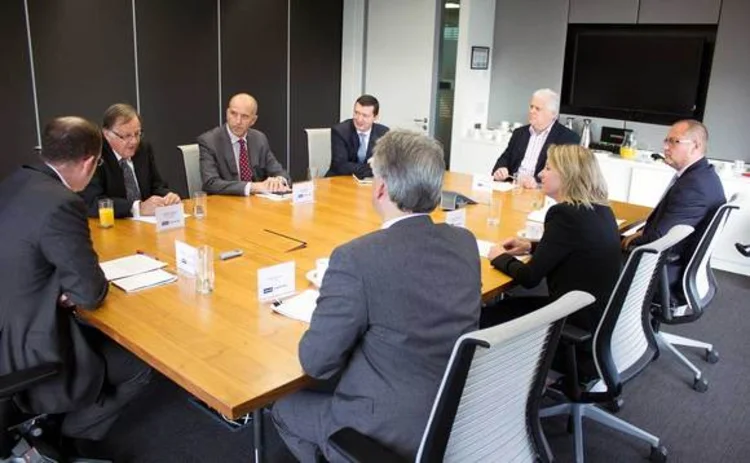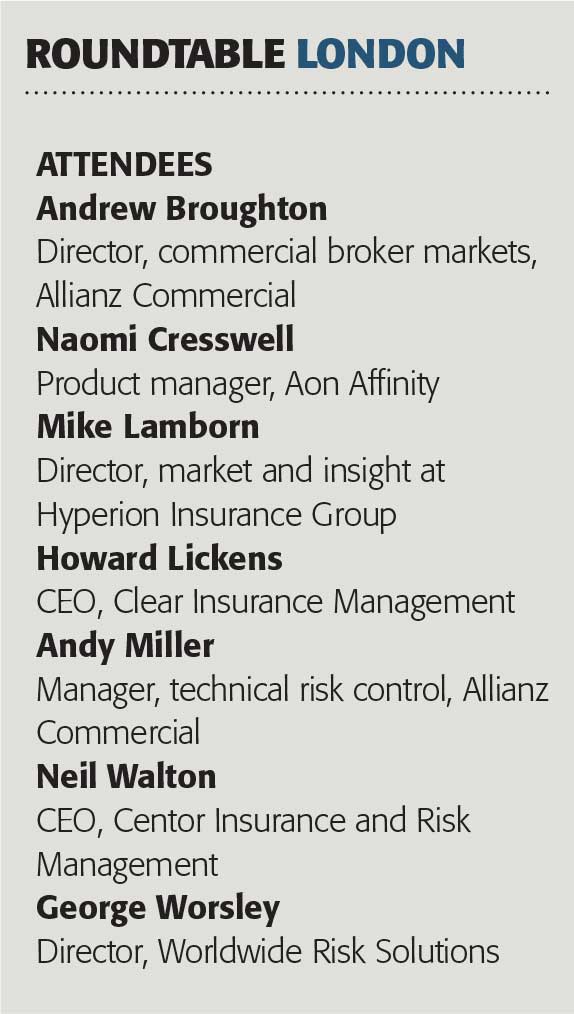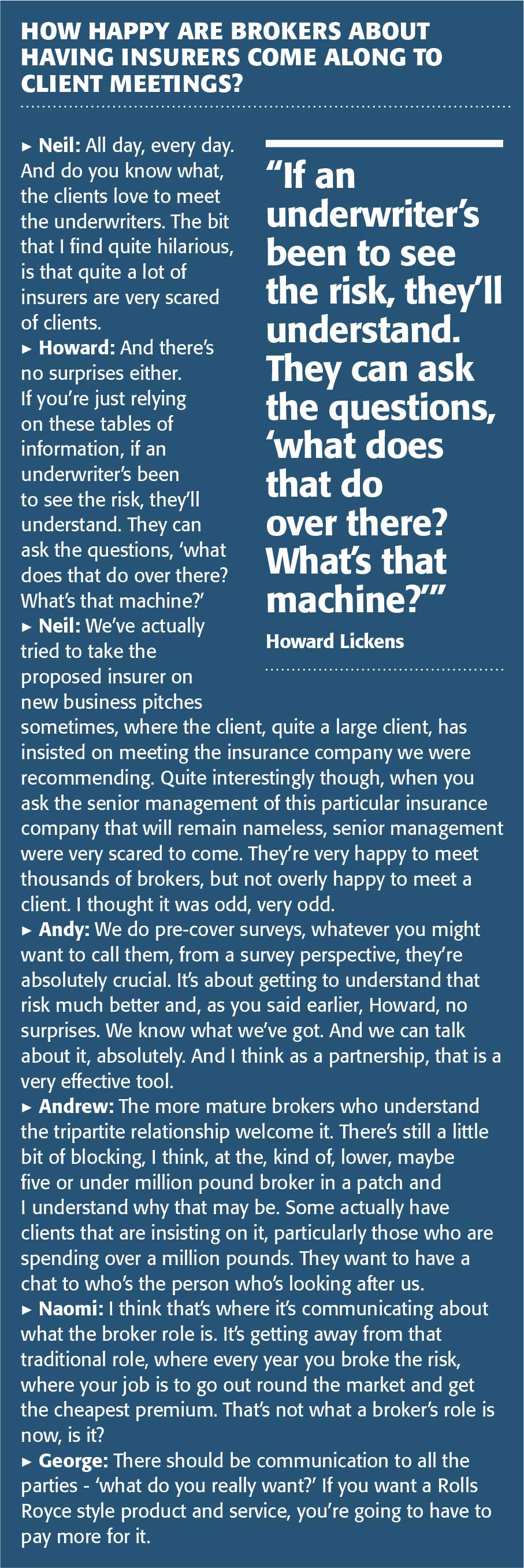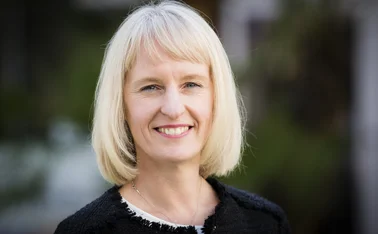
Power hour: Expanding horizons

Our panel of experts discuss how brokers can benefit from overseas ambitions, why longer contracts could be a boon and if insurers should meet the client, Emmanuel Kenning reports
 The government has long made a virtue of the UK exporting its way to growth. Are businesses now doing so?
The government has long made a virtue of the UK exporting its way to growth. Are businesses now doing so?
▶ Naomi: Traditionally, you had a business in the UK and then, as it grew, they exported. But actually now, there are some very small businesses that are exporting, their business model is exporting from day one.
▶ Neil: We’ve watched non-stop as clients continue to expand round the world. They’re not scared anymore of going places. Ten years ago people would look at the States and say, ‘I’m not going anywhere near America’. Now most of our clients who are growing will go straight there. They don’t worry so much and they end up going to the Far East and going to Europe. They’re doing it all the time now.
▶ George: Well, they say the world’s getting smaller, don’t they, with all this globalisation. Gone are the days that people would worry about a foreign risk, but they still have to make certain that they handle that properly – that they understand the cultures in the different countries, the compliance issues, the different laws.
 How do insurers help brokers who might say, ‘my client is exporting for the first time, I’ve not got international experience can you help’?
How do insurers help brokers who might say, ‘my client is exporting for the first time, I’ve not got international experience can you help’?
▶ Andrew: We’ve actually seen more and more of what we call, managed, provincial independent-style brokers, who have these sorts of risks. It seems to be, for us, a massive growth opportunity. No one fears international anymore and we need to meet that need and we’ll continue to work on that as we go.
Is there a danger for this type of broker that such clients might start to consider using your international broking competitors instead?
▶ Howard: I suspect that for the more sophisticated brokers it’s equally difficult to get your branch in Brazil to do something as it would be for us to do it via one of the global networks in some other middling sized broker, who’s very happy to do this.
▶ George: For the mega brokers, their size is what they’re disadvantaged by. I don’t know whether or not Ed in Chicago has ever met Patricia in London at a big broker. But the smaller brokers have network relationships. They meet up once a year and so it’s easier to go that extra mile for somebody you know, as opposed to just a name on the other end of an email.
▶ Naomi: What we’ve tried to do differently over the last few years is try and bring it together more. We now have somebody in the UK who’s actually a global co-ordinator. They have relationships with all those other countries, so you’ve got that funnel now. Where we add a lot of value is around some of the emerging markets. We’ve got expertise there. Europe’s getting a lot easier, isn’t it? But some of these small companies are actually starting to deal in China and Brazil and places like that.
▶ Andrew: What we see clearly is that the internationals still absolutely, by volume, own this space, particularly as you get towards the higher end. I think it’s a changing dynamic, but there’s almost a default, once you get to a certain size, to use a bigger player. I think we’re starting to see that change, which is why we’re meeting that demand, but there still is a big legacy in the internationals.
▶ Neil: There’s lots of opportunity for the independent broker still. We’ve done more mini globals in the last 12 months than we’ve ever done. Clients say, ‘you did a good job in the UK, if you can convince me you can do a good job in another four or five other territories, we’re happy to carry on’.
▶ Mike: Is that driven by the client wants choice, rather than, sort of the big three? Or is that driven by relationships?
▶ Neil: Driven by relationships, I think. They want you to carry on looking after them globally and because the globe has got smaller to a degree, I think their view is, well, you can do it for me. It’s not a problem.
▶ Mike: If I dealt with three different people with the first policy at the broker, that can make it difficult. Sometimes a small, independent broker will have far more continuity and I think that can work in its favour and that relationship will then go overseas.
 Brokers are investing a lot of time to build their international capabilities as clients increasingly export goods. What about Allianz’s time investment?
Brokers are investing a lot of time to build their international capabilities as clients increasingly export goods. What about Allianz’s time investment?
▶ Andy: It’s about fully understanding that business and what they’re moving into. We are able to provide some advice and guidance through connections within Allianz. I don’t, for one minute, sit here and know all the legislation that goes on in Turkey. But the contacts that we have within the Allianz group allow us to pick the phone up and speak to the local risk management people in Turkey, or we go out there and say, ‘we’ve got this: what do you think?’ We’re then able to help give feedback and guidance to those customers.
What are the next challenges for brokers after having built relationships with clients and international contacts – both providers and other brokers?
▶ Neil: You’ve got to charge for it. You can’t just keep saying, ‘yes, not a problem’. It’s actually, ‘yes and it will cost you this much more’. As long as they can see the perceived value of it, they’ll happily pay. But the trouble with brokers is we’re the world’s worst at just keeping doing things for nothing. If you’re putting all the effort in and the travel, especially on mini globals, you have to lay out your fee structure and expenses. Nine times out of 10, they haven’t got a problem with paying it, because they do it for all their other professional advisers around the world.
▶ Naomi: I completely agree. Our job as a broker is to sell our value and we haven’t done that particularly well. Which is why, you know, the advice and fees you get are lower than in other professional industries and that’s something we really do need to pick up on.
What demands should brokers be putting on insurers?
▶ Mike: There’s a constant need to refresh your education on what is going on. We’re in a continual race to keep up with what’s needed.
▶ Andrew: It’s about industry specialism, it’s about aligning to meet customer needs. We’re launching a series of industry-based segments in our mid-corporate range over the next 18 months, two years, so we’ll move from one, generalist-style product, to about 12, meeting various needs.
That’s been done in conjunction with some workshops with brokers. It’s been our review of the market, trying to work on a premise that we can segment so that brokers have something to go to clients with. We are getting a few brokers who have come to us now with these new propositions saying, can we partner? We’re also looking to learn in this space as we go.
▶ Howard: Where some insurers miss a trick is the rigid separation of the really big stuff, by premium, or by turnover. You could possibly mention one insurer beginning with an A, where you deal with a part of the business if the turnover’s over a certain level. And the other main part of the business doesn’t really want to deal with it. There are some cases where turnover just isn’t high enough, but those clients are really complicated and we should be able to support them. So you end up going to the American insurers, who set out their stall for complex.
▶ Andy: I can talk about the risk management angle in terms of what I feel insurers should be providing. It’s the site visit by the risk management specialists, as we call them, where we can really get to understand the business and, alongside brokers, offer quite an attractive package of measures that might help clients’ bottom line and give them a better risk profile, going forward.
Is there a push for longer term contracts, such as a three-year insurance deal to go with this in the mid-market?
▶ Andrew: Yes. That’s certainty there. There’s a level of comfort and also a demonstrative level of performance so we all know where we’re going to sit. [If] you’ve got enough experience, expertise and proactive relationships to make sure all parties understand the role they play… the client’s going to get some demonstrated value and something perhaps that varies from the competition.
▶ Neil: I think more and more clients want long-term agreements if they can get them. They like consistency, yes, very much so. And in all fairness, if you work with a good partner and they come back and say, ‘we want a tripartite agreement’ I want that for the client as well.
▶ Howard: Annual renewal is a daft concept.
▶ Neil: It’s the smaller ones, who are just starting to grow and they don’t even know where to start on risk management. They’re the ones who insurers should be ploughing in their funds and support. But I agree, there’s no good putting all the funds and support in, if when it comes round to renewal, they go somewhere else. And I agree with Howard, totally. I think this whole, 12 month thing is daft. Three year contracts would be much better.
▶ George: It’s got to be a process of building up knowledge, expertise and reputation. The carrier has to have reputation of being able to provide a good product and a service and handle the accounts.
And a small client might not necessarily feel that they get the right level of being taken seriously by some of the larger carriers, because they might have a heavy risk, but it’s a small one. For a large carrier to devote a lot of time and attention to a heavy risk that doesn’t develop much premium is a very difficult thing to sell.
▶ Mike: I do sometimes wonder, going back to the 12 month thing, there are quite a few countries in Europe who have tacit renewals and it’s a rolling programme and we don’t seem to adopt that.
▶ Andrew: We like all of that. But one issue is, how do you get your rate strength, because the economy’s changing, the profile of the risk can change year-to-year?
▶ Howard: You could argue that secures your rate strength. If you’ve got a long-term relationship you’re not going to get people dipping out, saying, ‘I’ve got a quote elsewhere, it’s 30% off’. So I’d probably argue, we’d get better rates for long-term solutions.

Only users who have a paid subscription or are part of a corporate subscription are able to print or copy content.
To access these options, along with all other subscription benefits, please contact info@insuranceage.co.uk or view our subscription options here: https://subscriptions.insuranceage.co.uk/subscribe
You are currently unable to print this content. Please contact info@insuranceage.co.uk to find out more.
You are currently unable to copy this content. Please contact info@insuranceage.co.uk to find out more.
Copyright Infopro Digital Limited. All rights reserved.
As outlined in our terms and conditions, https://www.infopro-digital.com/terms-and-conditions/subscriptions/ (point 2.4), printing is limited to a single copy.
If you would like to purchase additional rights please email info@insuranceage.co.uk
Copyright Infopro Digital Limited. All rights reserved.
You may share this content using our article tools. As outlined in our terms and conditions, https://www.infopro-digital.com/terms-and-conditions/subscriptions/ (clause 2.4), an Authorised User may only make one copy of the materials for their own personal use. You must also comply with the restrictions in clause 2.5.
If you would like to purchase additional rights please email info@insuranceage.co.uk








